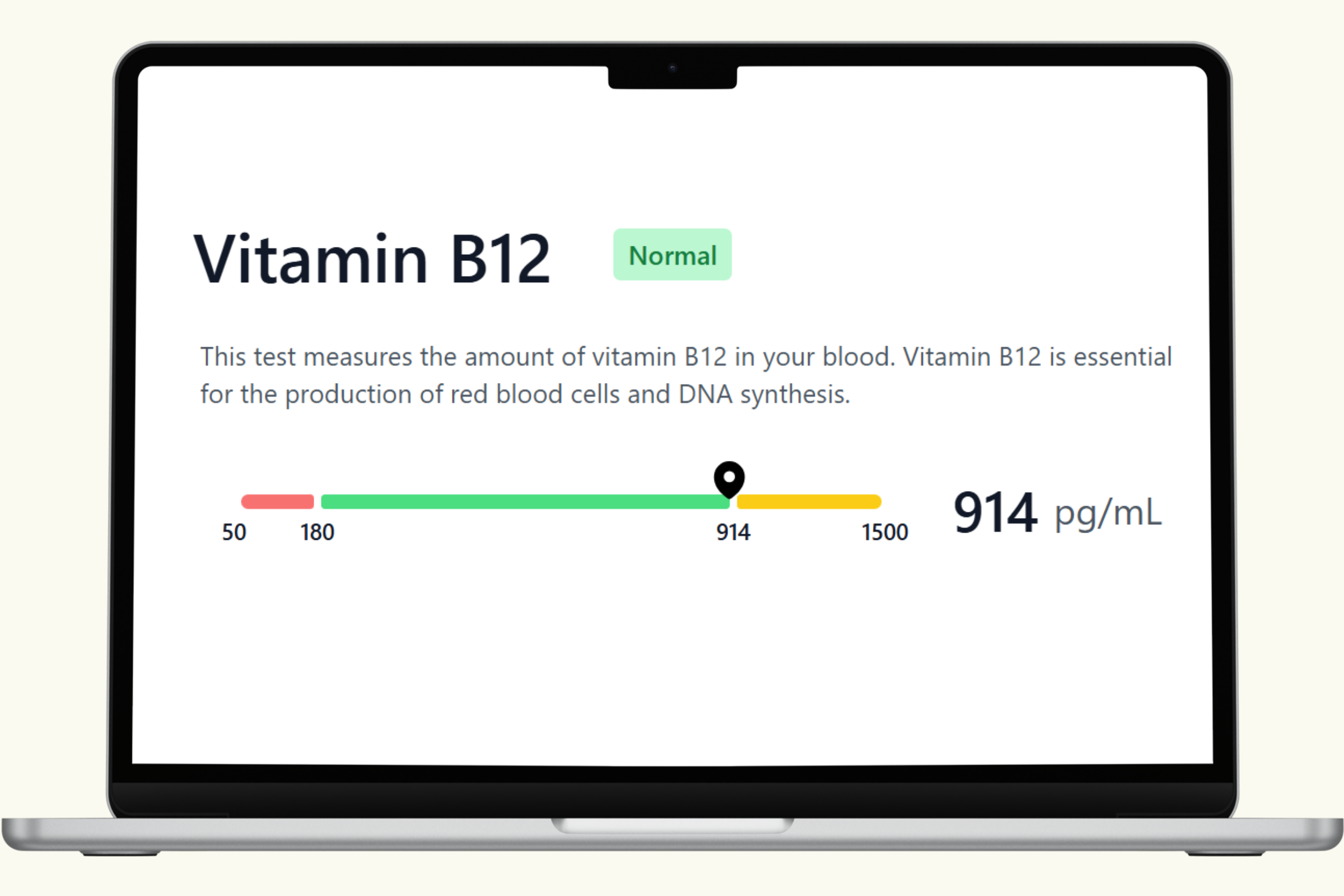Vitamin B12 Blood Test: Measuring an Essential Nutrient for Energy, Brain Health, and DNA Function
The Vitamin B12 Blood Test, part of the PlexusDx Nutrition Deficiency Blood Test, measures blood levels of cobalamin, a vital nutrient required for red blood cell formation, DNA synthesis, and proper function of the brain and nervous system. Since the body cannot produce vitamin B12 on its own, it must come from dietary sources or supplements. The liver can store years’ worth of B12, which means deficiency often develops slowly, but once it occurs, symptoms can be wide-ranging and serious. This test helps uncover nutrient imbalances early, empowering you to address potential issues before they lead to long-term health complications.
What Is Vitamin B12?
Vitamin B12, or cobalamin, is a water-soluble vitamin found naturally in animal-based foods such as meat, fish, eggs, and dairy. It is also available in fortified plant foods and supplements, making it accessible to people following vegetarian or vegan diets. Once consumed, B12 binds to proteins and is absorbed in the small intestine with the help of a protein called intrinsic factor, produced in the stomach.
B12 is essential for three major processes:
- Red blood cell production – Prevents megaloblastic anemia by supporting proper red blood cell formation.
- DNA synthesis – Ensures healthy cell division and genetic stability.
- Nervous system function – Maintains the protective myelin sheath around nerves and supports neurotransmitter balance.
Why Is the Vitamin B12 Test Important?
Measuring vitamin B12 levels provides valuable insights into:
- Energy and metabolism – Low B12 contributes to fatigue and weakness due to impaired red blood cell production.
- Neurological health – Deficiency may cause tingling in the hands and feet, memory problems, or cognitive decline.
- Methylation function – B12 works with folate to recycle homocysteine, influencing heart and brain health.
- Prenatal health – Adequate B12 is vital during pregnancy for fetal brain and nervous system development.
- Overall longevity – Maintaining B12 sufficiency supports optimal cognitive and cardiovascular health across the lifespan.
Vitamin B12 Blood Test Reference Ranges
Vitamin B12 levels are measured in picograms per milliliter (pg/mL) or picomoles per liter (pmol/L). Commonly used ranges include:
- Deficient: < 200 pg/mL (< 148 pmol/L)
- Borderline: 200 – 350 pg/mL (148 – 258 pmol/L)
- Sufficient: > 350 pg/mL (> 258 pmol/L)
- Functional/optimal range: 500 – 800 pg/mL (369 – 590 pmol/L), often associated with the best cognitive and neurological outcomes
Because symptoms may occur even at borderline levels, many clinicians use functional ranges to identify deficiencies earlier.
Signs and Symptoms of Vitamin B12 Deficiency
A shortage of vitamin B12 can affect multiple systems. Common signs include:
- Persistent fatigue and weakness
- Pale or jaundiced skin
- Tingling or numbness in the hands and feet
- Difficulty walking, balance problems, or muscle weakness
- Memory loss, confusion, or mood changes
- Glossitis (inflamed tongue) and mouth ulcers
- Anemia and shortness of breath
Because these symptoms overlap with other conditions, testing vitamin B12 levels is the best way to confirm deficiency.
Who Is at Higher Risk of Vitamin B12 Deficiency?
Vitamin B12 deficiency is more common in certain groups, including:
- Vegans and vegetarians – Since B12 is found mainly in animal foods, plant-based eaters need fortified foods or supplements.
- Pregnant and breastfeeding women – Demand for B12 increases to support fetal and infant development.
- Older adults – Reduced stomach acid and intrinsic factor production make absorption more difficult with age.
- People with digestive disorders – Conditions such as celiac disease, Crohn’s disease, or those who have had bariatric surgery may impair absorption.
- Heavy drinkers – Alcohol interferes with nutrient absorption and increases risk of deficiency.
- Individuals with methylation issues – Genetic variations, such as MTHFR mutations, may increase demand for B12 in active forms.
- Obese individuals – Higher prevalence of low B12 levels has been noted in those with obesity.
How to Improve Vitamin B12 Levels
Fortunately, B12 deficiency is highly treatable with proper nutrition and supplementation. Strategies include:
- Eating more B12-rich foods such as lean meats, fish, shellfish, eggs, and dairy.
- Choosing fortified plant-based foods such as non-dairy milk, nutritional yeast, and cereals.
- Taking supplements, including oral B12 tablets, sublingual forms, or injections when medically necessary.
- Using methylcobalamin or adenosylcobalamin supplements for better bioavailability in those with methylation challenges.
At-Home Vitamin B12 Testing with PlexusDx
The PlexusDx Nutrition Deficiency Blood Test allows you to measure vitamin B12 and other essential nutrients easily from home using a dried blood spot sample on an ADX card. This method is:
- Convenient – No need for lab visits.
- Accurate – Reliable measurement of B12 levels and nutrient status.
- Actionable – Results guide dietary and supplement choices to restore balance.
Who Should Consider a Vitamin B12 Blood Test?
This test is especially helpful for those who:
- Experience fatigue, weakness, or memory concerns
- Follow a vegan or vegetarian diet
- Are pregnant, breastfeeding, or planning pregnancy
- Are over age 50
- Have digestive or absorption issues
- Have a family history of anemia or methylation-related conditions
Take Charge of Your Nutritional Health with PlexusDx
The Vitamin B12 Blood Test, part of the PlexusDx Nutrition Deficiency Blood Test, provides a clear picture of your B12 status, helping you detect deficiencies early and take steps to restore balance. With simple at-home collection, fast results, and actionable insights, PlexusDx makes it easy to protect your energy, brain health, and long-term wellness.
Order your PlexusDx Nutrition Deficiency Blood Test today and ensure your vitamin B12 levels are optimized for vitality, cognitive clarity, and lifelong health.

Share:
Homocysteine Blood Test
Vitamin D Blood Test